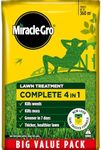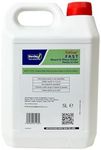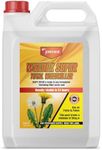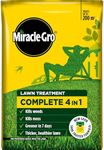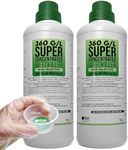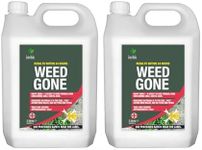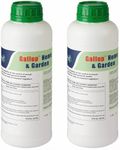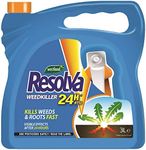Buying Guide for the Best Weed Killers
Choosing the right weed killer can make a significant difference in maintaining a healthy and beautiful garden or lawn. The key to selecting the best weed killer is understanding your specific needs and the characteristics of the product. Here are some important specifications to consider when choosing a weed killer, along with explanations to help you make an informed decision.Type of Weed KillerWeed killers can be classified into selective and non-selective types. Selective weed killers target specific types of weeds without harming other plants, making them ideal for lawns and gardens where you want to preserve certain plants. Non-selective weed killers, on the other hand, kill all plants they come into contact with, making them suitable for areas where you want to clear all vegetation, such as driveways or patios. Choose a selective weed killer if you need to protect certain plants, and a non-selective one if you need to clear everything.
Systemic vs. ContactSystemic weed killers are absorbed by the plant and travel through its system to kill it from the inside out, including the roots. This makes them effective for perennial weeds that can regrow from their roots. Contact weed killers, however, only kill the parts of the plant they touch, making them suitable for annual weeds that do not regrow from roots. If you are dealing with tough, perennial weeds, a systemic weed killer is the best choice. For annual weeds, a contact weed killer will suffice.
Pre-emergent vs. Post-emergentPre-emergent weed killers prevent weed seeds from germinating and are best used before weeds appear. Post-emergent weed killers are used to kill existing weeds. If you are planning ahead and want to prevent weeds from growing, a pre-emergent weed killer is ideal. If you already have weeds and need to eliminate them, a post-emergent weed killer is the right choice.
Active IngredientsThe active ingredients in weed killers determine their effectiveness and safety. Common active ingredients include glyphosate, 2,4-D, and dicamba. Glyphosate is a non-selective, systemic herbicide effective against a wide range of weeds. 2,4-D is a selective herbicide that targets broadleaf weeds without harming grasses. Dicamba is another selective herbicide effective against broadleaf weeds. Choose an active ingredient based on the type of weeds you are dealing with and the plants you want to protect.
Application MethodWeed killers come in various forms, including liquids, granules, and ready-to-use sprays. Liquid weed killers are often concentrated and need to be mixed with water before application, making them suitable for large areas. Granules are easy to apply and are often used for pre-emergent treatments. Ready-to-use sprays are convenient for spot treatments and small areas. Consider the size of the area you need to treat and your preference for convenience when choosing an application method.
Safety and Environmental ImpactSome weed killers can be harmful to pets, children, and the environment. Look for products that are labeled as safe for use around pets and children if you have them. Additionally, consider the environmental impact of the weed killer. Organic and natural weed killers are generally safer for the environment but may be less effective than chemical options. Choose a product that balances effectiveness with safety based on your specific situation.
